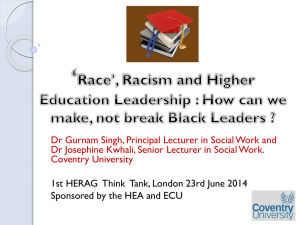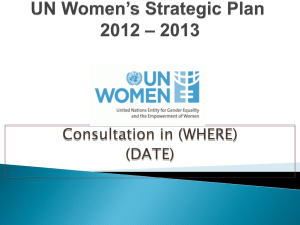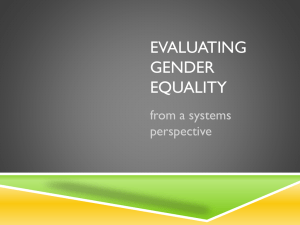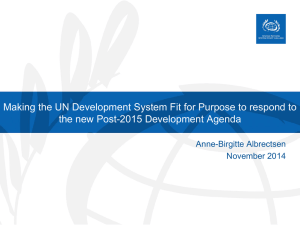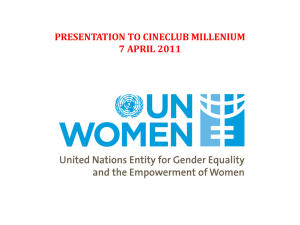New York, 27 February – 9 March 2012 - Capacity4Dev
advertisement
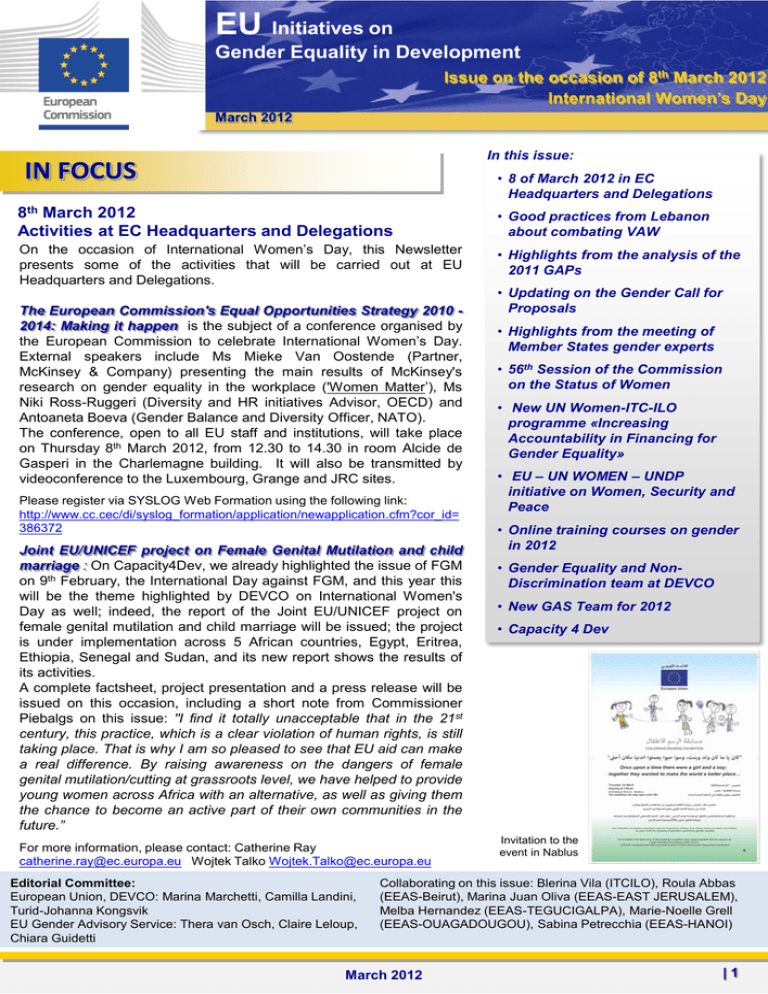
EU Initiatives on
Gender Equality in Development
Issue on the occasion of 8th March 2012
International Women’s Day
March 2012
In this issue:
IN FOCUS
• 8 of March 2012 in EC
Headquarters and Delegations
8th March 2012
Activities at EC Headquarters and Delegations
• Good practices from Lebanon
about combating VAW
On the occasion of International Women’s Day, this Newsletter
presents some of the activities that will be carried out at EU
Headquarters and Delegations.
• Highlights from the analysis of the
2011 GAPs
The European Commission's Equal Opportunities Strategy 2010 2014: Making it happen is the subject of a conference organised by
the European Commission to celebrate International Women’s Day.
External speakers include Ms Mieke Van Oostende (Partner,
McKinsey & Company) presenting the main results of McKinsey's
research on gender equality in the workplace ('Women Matter’), Ms
Niki Ross-Ruggeri (Diversity and HR initiatives Advisor, OECD) and
Antoaneta Boeva (Gender Balance and Diversity Officer, NATO).
The conference, open to all EU staff and institutions, will take place
on Thursday 8th March 2012, from 12.30 to 14.30 in room Alcide de
Gasperi in the Charlemagne building. It will also be transmitted by
videoconference to the Luxembourg, Grange and JRC sites.
Please register via SYSLOG Web Formation using the following link:
http://www.cc.cec/di/syslog_formation/application/newapplication.cfm?cor_id=
386372
Joint EU/UNICEF project on Female Genital Mutilation and child
marriage : On Capacity4Dev, we already highlighted the issue of FGM
on 9th February, the International Day against FGM, and this year this
will be the theme highlighted by DEVCO on International Women's
Day as well; indeed, the report of the Joint EU/UNICEF project on
female genital mutilation and child marriage will be issued; the project
is under implementation across 5 African countries, Egypt, Eritrea,
Ethiopia, Senegal and Sudan, and its new report shows the results of
its activities.
A complete factsheet, project presentation and a press release will be
issued on this occasion, including a short note from Commissioner
Piebalgs on this issue: "I find it totally unacceptable that in the 21st
century, this practice, which is a clear violation of human rights, is still
taking place. That is why I am so pleased to see that EU aid can make
a real difference. By raising awareness on the dangers of female
genital mutilation/cutting at grassroots level, we have helped to provide
young women across Africa with an alternative, as well as giving them
the chance to become an active part of their own communities in the
future.”
For more information, please contact: Catherine Ray
catherine.ray@ec.europa.eu Wojtek Talko Wojtek.Talko@ec.europa.eu
Editorial Committee:
European Union, DEVCO: Marina Marchetti, Camilla Landini,
Turid-Johanna Kongsvik
EU Gender Advisory Service: Thera van Osch, Claire Leloup,
Chiara Guidetti
• Updating on the Gender Call for
Proposals
• Highlights from the meeting of
Member States gender experts
• 56th Session of the Commission
on the Status of Women
• New UN Women-ITC-ILO
programme «Increasing
Accountability in Financing for
Gender Equality»
• EU – UN WOMEN – UNDP
initiative on Women, Security and
Peace
• Online training courses on gender
in 2012
• Gender Equality and NonDiscrimination team at DEVCO
• New GAS Team for 2012
• Capacity 4 Dev
Invitation to the
event in Nablus
Collaborating on this issue: Blerina Vila (ITCILO), Roula Abbas
(EEAS-Beirut), Marina Juan Oliva (EEAS-EAST JERUSALEM),
Melba Hernandez (EEAS-TEGUCIGALPA), Marie-Noelle Grell
(EEAS-OUAGADOUGOU), Sabina Petrecchia (EEAS-HANOI)
March 2012
|1
8th March in EU Delegations
Burkina Faso: 8th March in BF is a day off and, as is
customary every year, all towns – villages even – try to
organise something special; typically, most of the women
dress up in "pagne" (tissue) displaying its special logo.
Next Monday sees colleagues from the Delegation also
trying to dress in the official "pagne” (see the picture
below). A town is also officially chosen by the government
for a big ceremony; this year, the town selected is
Dédougou and the debate theme is "Social mobilisation for
the reduction of women’s mortality : what is the role of
men" ?
For more information:
GRELL Marie-Noelle (EEAS-OUAGADOUGOU) MarieNoelle.GRELL@eeas.europa.eu
Honduras: Responding to an invitation from the UN
Women Local Office, the EUD in Tegucigalpa will
publish an article related to the EU's Strategy on Gender
Equality and Women's Empowerment in Development
Cooperation in a national newspaper.
Moreover, under the Support to Food Security in
Honduras Program (PASAH), the Technical Unit for
Food Security (UTSAN) in collaboration with a private
enterprise, will showcase the American film "The Help",
which illustrates the discrimination of women at work.
For more information:
HERNANDEZ Melba (EEAS-TEGUCIGALPA)
Melba.HERNANDEZ@eeas.europa.eu
Lebanon: The EUD in Beirut has decided to celebrate
Women's Day during March, but not specifically on 8th
March, in order “to have a clear message to address
and be visible as much as possible”; an event will be
organised on 19th March, for which the agenda is still
under preparation; a tentative schedule should include a
documentary on a Nationality campaign (show cases), a
KAFA documentary on GBV in Lebanon (testimony) and
a debate involving deputies, ministers and NGOs .
For more information:
ABBAS Roula (EEAS-BEIRUT)
Roula.ABBAS@eeas.europa.eu
OPT: Events scheduled in the OPT started in March
and include activities in different parts of the territory.
On 1st March, the Office of the EU Representative in
Jerusalem (EUREP) will launch an exhibition in Nablus
with the best 65 drawings from the Palestinian children
who took part in the 2011 Drawing Competition on
Gender Equality. The children whose drawings have
been exhibited will receive a small prize and the finalists
whose drawings were sent to Brussels will receive a
photo camera. This exhibition has already been
presented in Gaza with great success among the
participating children and has received impressive
media coverage (see also the picture on page 5).
On 7th March, the Palestinian NGO, Shashat Women's
Cinema, which is receiving EU funding for a yearly
festival of women's short films "I am a woman from
Palestine", will launch the first of a weekly 6-episode TV
broadcast on the Palestine national television channel.
The broadcasts will include discussions on the short
films and related women's issues, and the first
broadcast of 07/03 will include an interview of the GFP.
On 8th March, at the request of EUREP, the radio station
“Nisaa FM” will broadcast a special live discussion with
EU-funded women's organisations about their work.
Projects to be discussed include support to victims of
violence, advocacy on inheritance and property rights
and support to cultural productions. Nisaa FM, based in
Ramallah, is the only professional female-led radio
station in the region, whose objective is to promote the
contribution of Palestinian women to all sectors of
society.
For more information:
JUAN OLIVA Marina (EEAS-EAST JERUSALEM)
marina.juan-oliva@eeas.europa.eu
Vietnam: The GFP in Hanoi organised a couple of
training events on gender.
A two-day training session for colleagues from the
operations section was organised to build the internal
capacity of EUD operational staff in order to mainstream
gender in the cooperation portfolio, as required by the
EU-GAP. The training session is also registered in
Syslog.
A one-day workshop with EU bilateral partners in
Vietnam is also scheduled to exchange knowledge and
experiences on gender issues in order to enhance the
mutual understanding on how to promote gender
mainstreaming within the cooperation portfolio of the EU
in the country.
For more information:
PETRECCHIA Sabina (EEASHANOI) Iulia.PETRECCHIA@eeas.europa.eu
March 2012
|2
Best Practice: Raising awareness on VAW
LEBANON: CEDAW from Theory to Practice
Last year, on the occasion of International Women’s
Day, KAFA (enough) Violence & Exploitation
launched a Regional Lobbying and Media Campaign on
Lifting the Reservations on Article 16 of the Convention
on the Elimination of All Forms of Discrimination against
Women (CEDAW), addressing equality between men
and women in marriage and family life.
This was a part of a project entitled "CEDAW from
Theory to Practice" funded by the European Union and
implemented by KAFA in cooperation with the Arab
Women Organisation in Jordan and the Syrian Women's
League.
The project primarily aims at promoting the full
implementation and use of CEDAW, especially among
judges, lawyers and civil society organisations. The
project is also designed to raise awareness towards the
importance of using CEDAW as a tool to improve
respect for women's rights, as well as to push
governments to lift their reservations on the Convention.
In addition, KAFA and its partners have conducted and
published studies, tracking to what extent CEDAW is
being used in Lebanese, Jordanian and Syrian courts,
highlighting best practices as well as the violations of
the Convention by these courts.
The unipoles and posters were designed to raise
awareness on the importance of pushing governments
to lift their reservations on the Convention.
Hereunder are some elements of the Campaign, in
Arabic, that can also be accessed by clicking on:
http://www.kafa.org.lb/Photos.aspx?code=34&Category=2.
For more information, please contact:
ABBAS Roula (EEAS-BEIRUT)
Roula.ABBAS@eeas.europa.eu
Call for Proposals on Gender
The call "Investing in People - Strengthening
protection and promotion of women's rights and
women's social and economic empowerment" EuropeAid/131087/C/ACT/Multi - closed on 30/01/2012.
On the basis of past experience, about 500 concept
notes were expected, but about 2000 emails were finally
received. The Legal and Financial unit - D6 - is now
checking the received emails, to identify double
submissions and incomplete documents etc. The
process is still ongoing and this means the final number
of received proposals is not yet clear.
Unit D6 is also in charge of informing Delegations about
the concept notes they are supposed to evaluate. The
contact
person
is
Stelvio
Arduino (stelvio.arduino@ec.europa.eu ).
For the assessment in Brussels, five experts were
originally hired. Their number is being increased to 8, as
well as the number of working days per assessor.
Planned timing of the assessment procedure:
• Mid February to end of April: Concept Notes
assessment
• By mid May: Evaluation Committee to define ranked
list and invitation to submit Full Proposals
• By end June/beginning of July: deadline to submit Full
proposals
• By end July: assessment of FP
• August - September: internal procedure for the funding
decision
• From September to December: Delegations will have
the responsibility to complete the contracting procedure.
For more information, please contact:
Marina Marchetti
marina.marchetti@ec.europa.eu
The blue picture, in Arabic, shows
that the weather temperature in
Beirut, Damascus and Jordan is 16 degree Celsius referring to
article 16 of CEDAW about
marriage; still a long way to go for
Lebanon!
March 2012
The picture below represents the civil code
status which is 16 underground (zefet in arabic
means Asphalt) this is an insinuation on how bad
is the civil code in Lebanon towards women.
|3
Gender Action Plans: some
highlights from 2011 reports
Big step forward in EU Accountability on Gender:
Report on the implementation of the ‘EU Plan of
Action on Gender Equality and Women’s
Empowerment in Development (2011-2015)’.
The first joint reporting of EU Member States and EU
Delegations on the implementation of the Gender Action
Plan was presented to the European Council in
December 2011. “The fact that this report is mandatory
means that all of us need to be accountable on what we
do in gender; we have indicators, we have deadlines,
we have to achieve the objectives [of the Gender Action
Plan]”, says Elena Volpi in an interview with the
editorial team of Capacity4dev .
The report shows a wide range of approaches on how
EU Policies on promoting gender equality and women’s
empowerment are put in practice. A series of inspiring
good practices are included in the report. Interesting
achievements are those of EU Member States which
have introduced mechanisms and procedures to ensure
a gender equality perspective in policy and
implementation instruments, including budget support
programmes and macroeconomic dialogue and policies.
Support to non-state actors generally seems to integrate
requirements regarding gender. The reports of EU
Delegations and EU Member States also cited
numerous examples on the implementation of the UN
Security Council Resolutions on Women, Peace and
Security (UNSCR 1325, 1820, 1888 and 1889).
This first GAP reporting exercise provided an
opportunity to test the indicators and to identify those
that need to be clarified. Follow-up on this issue was
undertaken during the meeting of gender experts of EU
Member States in Brussels on 5th and 6th March 2012,
and a guidance note will be prepared for the next
reporting period.
The reports from Member States, Delegations and the
Commission revealed a series of lessons learned,
including the need to build the capacity of EU
Delegation staff (not only GFPs) to integrate a gender
equality perspective in all sectors of EU bilateral
cooperation (including budget support); greater fine
tuning at Delegation level between political and human
rights dialogue and development cooperation; and more
gender equality perspectives in local calls for proposals.
Several recommendations of the report are focused on
improving the process of GAP reporting, including the
establishment of a baseline. A general conclusion of the
report is that much more could be achieved by EU
Delegations, the Commission and Member States by
sharing and learning from each others' best practices in
GAP implementation.
Ahmad Nubani, from Nablus, one of the 10 Palestinian finalists in last
year's competition, who received a prize on 1st March 2012.
Strategic objectives of the EU Gender Action Plan
(2010-2015)
Strengthen the lead role of the EU in promoting
Gender Equality and Women's Empowerment in
development (GEWE)
Place gender equality issues systematically on the
agenda of dialogues with partner countries
Ensure adequate human and financial resources for
GEWE
Ensure that gender equality is mainstreamed in EU
funded projects and that budget support programmes
and SWAPS (sector-wide approaches) use sexdisaggregated indicators and include gender equality
performance indicators
Prioritise in-country Non State Actors (NSAs)
participation and capacity building and advocacy on
GEWE
Support to partner countries in their efforts to achieve
the Millennium Development Goals (MDGs), in
particular MDG3 and MDG5 on gender equality and
maternal health.
Strengthen EU support to partner countries in
combating gender-based violence and all forms of
discrimination against women and girls
Support partner countries in fully implementing United
National Security Council Resolutions (UNSCR) 1325,
1820, 1888 and 1889.
Link to the 2011-GAP-report
http://register.consilium.europa.eu/pdf/en/11/st17/st17880.en1
1.pdf
On Capacity4Dev website:
http://capacity4dev.ec.europa.eu/publicgender/document/2011-report-implementation-gender-actionplan-0
March 2012
|4
56 CSW – New York, 27 February – 9
March 2012
Mamber States Gender experts
meeting - Brussels, 5-6 March 2012
On 5th and 6th March 2012, the DEVCO-building in Rue
Joseph II 54, hosted the MS Gender Experts Meeting,
which had a special focus on the implementation of EU
GAP reporting exercises.
The first day was directed specifically towards Member
States, with ad hoc sessions aiming to discuss the EU
Gender Action Plan 2010-2015 (1st Session), revising
relevant and critical issues related to reporting, such as
indicators and baselines, coordination mechanisms (3rd
Session), sharing experiences and learning from each
others best practices (2nd session),
The second day was dedicated to other “external”
issues, such as common guidance notes to heads of
missions, with a particular focus on sustainable
development (4th Session); the implementation of
training-related objectives and actions in the GAP (5th
Session).
Finally, a meeting with civil society organisations and
international partners was held in order to discuss, inter
alia, progress and challenges in implementing the GAP,
the Agenda for Change from a gender perspective,the
Busan commitments on gender, and women in fragile
states.
The outcome of the MS meeting will be published on
capacity4dev.eu
For more information, please contact:
Marina Marchetti marina.marchetti@ec.europa.eu
Exhibition in Gaza for the Drawing Competition on Gender
Equality”
Tomorrow (9th March 2012), the 56th session of
the Commission on the Status of Women will end with
the issue the “agreed conclusions”; this year, the priority
topic has been the empowerment of rural women and
their role in poverty and hunger eradication,
development and current challenges.
The CSW is a functional commission of the United
Nations Economic and Social Council (ECOSOC); it
was established by ECOSOC resolution 11(II) of 21st
June 1946 with the aim to prepare recommendations
and reports to the Council on promoting women's rights
in political, economic, civil, social and educational fields.
In this regard, it represents a principal global policymaking body dedicated exclusively to gender equality
and the advancement of women.
Every year, the CSW session is held at United Nations
Headquarters in New York to evaluate progress on
gender equality, identify challenges, set global
standards and formulate concrete policies to promote
gender equality and women's empowerment worldwide.
The
webpage
of
the
CSW
Session
http://www.un.org/womenwatch/daw/csw/56sess.htm
includes details on the meeting agenda, as well as
official discussion papers for each panel. By 9th March,
agreed conclusions of the session will be also available.
Here is a summary of the main topics of this year’s
agenda. Priority theme: The empowerment of rural
women and their role in poverty and hunger
eradication, development and current challenges
1. Panel: Economic empowerment of rural women
2. Panel: The role of gender-responsive governance
and institutions for the empowerment of rural
women
Review theme: Financing for gender equality and
the empowerment of women (discussions and review
of the priority theme of the previous 2011 session agreed conclusions - from the fifty-second session)
3. Panel: National experiences in implementing the
agreed conclusions on financing for gender equality
and the empowerment of women
4. Panel: Progress in financing for gender equality
from the perspective of international organisations
and multilateral development partners
Emerging issue: Engaging young women and men,
girls and boys, to advance gender equality
(preliminary discussion on the priority theme of the
subsequent 2013 session)
5. Panel: Engaging young women and men, girls and
boys, to advance gender equality.
March 2012
|5
EU – ITC ILO – UN WOMEN - Increase Accountability in Financing for Gender Equality
Inception phase of the Programme “Increasing
Accountability in Financing for Gender
Equality (FfGE)”
The European Commission (EC), the United Nations
Entity for Gender Equality and the Empowerment of
Women (UN Women) and the International Training
Center of the International Labour Organisation
(ITC/ILO) have launched a new programme entitled
“Increasing Accountability in Financing for Gender
Equality (FfGE)”.
For the next 3 years, this programme, managed by UN
Women and supported by the EC and Spain, will work
with governments, civil society and bilateral and
multilateral donors to strengthen capacities and
accountability systems for financing and implementing
gender equality priorities in Ethiopia, Haiti, Honduras,
Jordan, Kyrgyzstan, Nicaragua, Occupied Palestinian
Territory (Opt), Senegal, Ukraine, Cameroon, Tanzania,
Nepal, Peru, Bolivia and Rwanda as well as in Zambia.
The overall aim of the programme is to increase the
volume and effective use of aid and domestic resources
to implement national commitments to gender equality
and women’s empowerment. UN Women will take the
lead in supporting national partners in mainstreaming
gender in national and joint coordination processes. EU
Delegations will also strengthen efforts to mainstream
gender equality in the programming cycle, including
through technical capacity building provided by ITC/ILO.
The programme outcomes are:
National action plans for gender equality have
defined targets, financing and implementation
arrangements are aligned with national planning and
budgeting processes.
Strengthened capacity and accountability of national
governments
to
implement
gender
equality
commitments and address women’s priorities in national
planning, budgeting systems and programming.
Strengthened capacity and accountability of donors
and stakeholders in aid coordination mechanisms to
achieve commitments towards gender equality in stable
and fragile countries.
Feminist economists and gender equality advocates
engaged effectively in contributing to stronger policy
coherence on gender equality in economic and
development effectiveness policy fora.
The programme builds on past experience, lessons
learned and knowledge in the areas of Gender
Responsive Budgeting (GRB), Gender and Aid
Effectiveness (AE) and costing of gender equality
priorities. It also builds on the processes related to the
aid effectiveness agenda as outlined in the Paris
Declaration on Aid Effectiveness (2005) and the Accra
Agenda for Action (2008) as well as the agreed
conclusions adopted by the 52nd Commission on the
Status of Women (CSW) 2008 (on adequate financing
for gender equality) whose progress has been reviewed
at the 2012 CSW.
The programme has finalised its inception phase, during
which, each of the countries, in line with national
priorities, has already identified sectoral focus that
includes: Agriculture and food security, Social Protection
and Employment, Education, Access to Justice and
Violence against Women. Results and strategies will be
discussed with global and national partners at a global
workshop in May 2012.
For more information, please contact:
EC - Camilla Landini Camilla.landini@ec.europa.eu
UN Women - Nisreen Alami: nisreen.alami@unwomen.org
ITC/ILO - Benedetta Magri-Short: b.magri@itcilo.org
Another joint initiative : EU – UN WOMEN - UNDP initiative on Women, Peace and Security
A new multi-country initiative, following the EU Policy on Women, Peace and Security, to enhance women’s
participation in peace-building and post-conflict planning and economic recovery was launched last month jointly
by the European Commission, the United Nations Entity for Gender Equality and the Empowerment of Women
(UN Women) and the United Nations Development Programme (UNDP). It is a 2 year programme piloting a
model for EU/UN collaboration on Women, Peace and Security, thus aiming at strengthening the capacity and
coordination of women’s civil society organizations and relevant EU and UN actors and supporting women’s
participation in peace-building. Kosovo (UNSCR 1244), Timor-Leste and Liberia are the three strategic locations
selected for this pilot programme, which will have a special focus on post-conflict planning and financing, the rule
of law and post-conflict economic recovery.
External IfS website: http://eeas.europa.eu/ifs/index_en.htm
Peace-building Partnership Portal: https://webgate.ec.europa.eu/tariqa/PeaceBuilding/index.php
For more information, please contact: Gladys Evangelista gladys.evangelista@ec.europa.eu
March 2012
|6
NEW DEVCO Structure @ Gender Equality and Non Discrimination Sector
The gender equality and non
discrimination team at DEVCO
headquarters –
Below: Martha Mendez (picture
on the right here below) and and
Virginie Ramey (taking office on
the 1st March – on the left side).
The "gender equality and non discrimination" sector is
part of the D1 Unit - "Governance, Democracy, Human
Rights and Gender".
The sector deals with 4 different topics: gender equality
and women empowerment (GEWE); child rights' (CR)
promotion and protection as well as rights of indigenous
peoples and of persons belonging to (sexual, religious,
ethnic, etc) minorities. Varied tasks were inherited from
3 different DGs of the former DEV and AIDCO structure:
policy follow-up, programme and project management
and quality support. The sector supports policy
implementation in the 4 aforementioned topics. For
GEWE, the Gender Action Plan implementation and
reporting
is
the
main
issue.
Thanks to… two valuable colleagues who played a crucial
role at HQ in the formulation and implementation of the EU
Gender Action Plan (GAP) who have recently left DEVCO.
Victoria Correa, a policy advisor on gender,
coordinated the process that led to adoption
of the GAP by the EU Council, chaired by
Spain in 2010.
In an inspiring way, she created broad support for this plan
among all parties, including colleagues from HQ and
Delegations, Member States, and Civil Society.
Elena Volpi, programme quality manager
for gender, was strong in developing
strategies to increase accountability on EU
gender equality commitments, including inhouse capacity building, coordination of
the reporting process on the implementation of the GAP and
the promotion of gender mainstreaming in core training.
Thanks to Elena’s strong analytical skills, the first annual
implementation report on the GAP was presented to the
European Council in December 2011.
Both Elena and Victoria were a driving force of the gender
machinery at DEVCO. We will miss their presence at HQ and
wish them both success in their further professional career.
Thanks Elena and Victoria; you both pushed policies and
strategies which make a difference to the lives of thousands
of women and girls who equally benefit from EU
development cooperation!
Briefings for the Commissioner and replies to European
Parliament questions are provided almost daily; followup of EU Council and European Parliament committees,
as well as the mainstreaming of all the targeted groups'
rights in Commission development policy documents
and guidelines (MFF; communications; inter service
consultations, etc…) are also part of its responsibilities.
The sector manages part of two different programmes:
the Investing in People programme for the gender and
child rights topics; and the EIDHR for the protection of
all the mentioned groups' rights.
A call for proposals on gender equality was launched in
the Investing in People programme last year, with a
deadline on 30th January 2012 (see more info in article
on page 4): the submitted concept notes are being
evaluated. A new Investing in People - call for proposals
will be launched in 2012 on child rights and finally, an
EIDHR call for proposals will be launched in 2013.
Together with the procedure of launching, evaluating
and concluding calls for proposals, the sector manages
several projects, essentially contracts concluded with
UN agencies (targeted actions).
Finally, the sector provides quality support to
Delegations in the implementation of the 4 policies, even
if the major support activities focus on gender equality
and child rights. Two advisory services' contracts have
been concluded with GEWE and CR experts. The
description of the former is available on the last page of
this Newsletter. For the latter, please contact the head of
sector.
Three online training courses on gender equality will be
provided (see also article on page 8) and specific short
training modules will be developed, to be included in
larger seminars organised at headquarters or in
Delegations to mainstream gender equality in PPCM;
Budget Support; Policy Dialogue; Conflict Prevention,
Crisis Management and Peace Building; Human Rights
and Democratisation; Water and Sanitation; Private
Sector; Energy; Agriculture, environment, natural
resources.
March 2012
|7
Gender Advisory Services 2012
Online Gender Training
DEVCO’s ONLINE COURSES 2012
Three ONLINE courses will be offered in 2012 in
English. Each course will last approximately 10
learning hours, including readings and exercises. You
will receive the support of a personal tutor. There are
no fixed time schedules. Participants are free to follow
the course at a time which is most convenient for
them, as long as they finish it before the closure date.
Students who finish the course will receive a
certificate.
DEVCO - Gender Online Course 1: Basic Training
on Gender and Development / 8th March - 9th April
Registration in Syslog for EC staff:
http://www.cc.cec/di/syslog_formation/application/catalogue.cfm?co
r_id=385390
Registration in Syslog for EEAS staff via sTESTA:
http://intracomm.ec.testa.eu/di/syslog_formation/application/catalog
ue.cfm?cor_id=385390
Do you want to have a meaningful dialogue on gender and
development? Then this course is meant for you. You will
receive all basic knowledge on the history, key concepts and
EU Commitments on gender and development. No previous
knowledge on gender issues is required.
DEVCO - Gender Online Course 2: Basic Tools &
Strategies for Gender Mainstreaming in EU
Development Cooperation / 30th April - 28th May
Registration in Syslog for EC staff:
http://www.cc.cec/di/syslog_formation/application/catalogue.
cfm?cor_id=385398
Registration in Syslog for EEAS staff via sTESTA:
http://intracomm.ec.testa.eu/di/syslog_formation/application/
catalogue.cfm?cor_id=385398
Are you interested in the basic tools and strategies to
promote gender equality in development cooperation? You
will find them in this on-line course. A prerequisite for this
course is that you have basic knowledge on key concepts
and EU Commitments regarding gender and development. It
is recommended to follow first the DEVCO-Online Course 1
before starting this course.
DEVCO - Gender Online Course 3: Gender
Mainstreaming through the Project Approach / 18th
June – 16th July
Registration in Syslog for EC staff:
http://www.cc.cec/di/syslog_formation/application/catalogue.
cfm?cor_id=385427
Regoistration in Syslog for EEAS staff via sTESTA:
http://intracomm.ec.testa.eu/di/syslog_formation/application/
catalogue.cfm?cor_id=385427
Are you involved in EU Development Projects? Then you
should not miss this opportunity. This course will give you
the tools to enhance gender equality and women’s
empowerment in all the phases of project cycle management
(PCM). A prerequisite for this course is to be familiar with the
EU approach of PCM and to have basic knowledge on
gender and development. It is recommended to do the
DEVCO-Online Courses 1 and 2 before starting this course.
EU Gender Advisory Services 2012 (GAS) is a
project led by AETS to provide training and
methodological
support
on
Gender
and
Development to DEVCO and EEAS staff.
The main objective of the EU Gender Advisory
Services is to strengthen the gender capacity
building of EU staff at HQs and Delegations across
all EU external cooperation instruments and
development cooperation sectors, including political
and policy dialogue, in order to achieve the targets
set forth in the EU Action Plan on Gender Equality
and Women Empowerment.
The team is composed of 2 senior experts assisted
by a junior expert.
Thera Van Osch, Team Leader, is the course designer
of the 3 online courses on gender mainstreaming.
Languages: English, Spanish, Dutch and German
Claire Leloup, Senior expert, also participated in the
building of the 3 gender online courses provided by
DEVCO and will be the tutor backstopper.
Languages: English, French and Portuguese
Chiara Guidetti, junior expert, will be the tutor of the EC
Gender online training.
Languages: English, French, Spanish, Portuguese and
Italian.
The specific objectives of this assignment and areas
of activity of the GAS, are:
Gender Mainstreaming in core EU training
courses
Three online training courses on gender
Guidance and technical assistance to EU staff on
implementing the GAP
Dissemination and visibility of best practices on
gender mainstreaming
Strengthen the network of Gender Focal Persons
in EU Delegations.
For more information, please contact:
marina.marchetti@ec.europa.eu
Share experiences, check
events and receive news
related to gender issues on
Capacity4Dev platform!
Join the Public Group on
Gender and Private group
for GFP !
For more information about registration for the three
online training courses, please contact:
Anne Caudron
Anne.Caudron@ec.europa.eu
March 2012
|8



